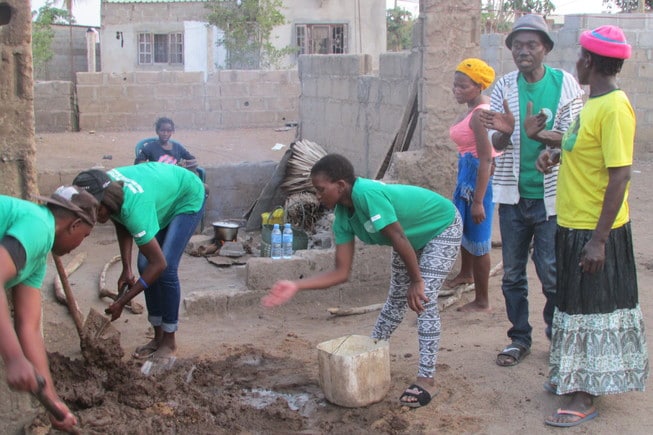How Moamba became the first district in Mozambique to phase out harmful cooking practices
Traditional cooking practices in Moamba district, Mozambique, used to cause major social, health, and environmental problems. A project led by the NGO Kulima, supported by Friends of the Earth Norway (Naturvernforbundet) and the Norwegian development agency (Norad), has converted practically all household in the districts to improved stoves.

In Moamba, a district in Mozambique with around 34,000 people, traditional cooking practices created major social, health, and environmental problems. More than 75 per cent of the population lives in poverty and depend on firewood for cooking. Cooking takes place on three-stone open fires inside the kitchen.
Beside severe health problems from inhaling in dense smoke from the open fire, access to firewood is becoming more and more challenging. The forests around the villages are already overexploited and the distance to collect firewood is growing longer. A large number of the households must buy firewood, imposing substantial expenses on the household budget.
A project to address this issue offered support for local leaders and citizens to change traditional cooking habits. Local leaders mobilized citizens, collected lists of households signing up for an improved stove, gathered financial contributions from each household to cover the raw materials, and identified local activists that were willing to participate in the construction work required after training.
The nation-wide NGO Kulima has worked for four years in Moamba with awareness raising, training local activists in on-site production of fixed improved clay stoves with chimneys, and providing technical assistance during construction and use. Today, practically all household in the districts have converted to improved stoves, with construction of more than 9,000 stoves.
A three-stone fire needs 4-10 wood logs to burn properly. Heat and smoke go in all directions. Less than 10 per cent of the energy is utilized for heating the food. In an improved stove, 1-3 logs is enough to keep the fire running in the insulated chamber, where the smoke is partly burned at high temperature, and the rest escapes through the chimney. Wood consumption is reduced by 60 – 70 %.


The pictures from left to right show the first stove built in Moamba in 2015, still in daily use, and activists in progress with a new stove. Note the number of wood sticks in the stove (left) and the open fire (right).
The project is 100 per cent funded by Norad/ Naturvernforbundet, with approximately 640,000 Norwegian kroner (NOK) to cover for the total costs of the Moamba activities. In random monitoring visits to the beneficiary households in Moamba, residents informed us that they typically save 6 -7 out of 10 bundles of firewood a week at a value of 300 Mozambican meticals (MTZ). Annual savings are appreciably 2,000 NOK per households. Over five years, the minimum lifetime of the stoves, this represent 65 million NOK in cash savings for low income beneficiaries in the district.
The direct economic benefits are highly appreciated by the households. When asked how they spend the economic savings, most of the families say that it is spent on providing a better diet for the family. Ensuring enough food every day is the main priority for the households. Savings also enable more families to provide lunch for their children to take to school. The next priority is to pay school fees and purchase school materials, such as books, pencils, and pens. Many also use the savings for medicine and hygiene articles, and investment in agriculture, like buying seeds and hiring additional manpower. Others can invest the savings in small businesses.
Smoke from cooking has a heavy impact on health, especially on women and small children, who spend most time around the three-stone fire. In inquiries among users that have left the three-stone fire and now use the improved cook stove, 98 per cent say that they previously had experienced severe negative health impacts from the smoke. After half a year, 97 per cent reported that the health impact is substantially reduced or eliminated.
The accumulated benefits can be quite high, given the multiple channels through which access to modern energy services can lead to positive development effects. This is exemplified by some of the unexpected results observed in the project:
- The new stove is also used for income-generating activities. The stove has space for two pots, and many use one for cooking for the family, and the other for soup and food that is sold locally.
- The collective approach with strong community involvement and locally made stoves not only made it affordable for most families, but also made it possible for the community to assist families that could not afford even the smallest investment.
- The introduction of improved stoves inspired many to innovate new structures for storing pots and pans and help prepare food and dry firewood or corn above the stove.
- Many participants starting as local activist have managed to use the project as a stepping stone for their own career.